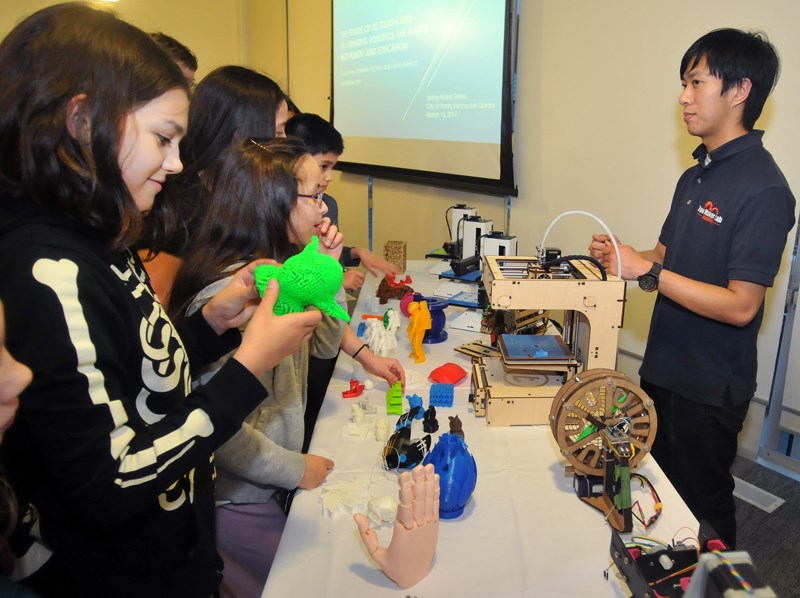Technology, robotics and basically the entire system of economic production are rapidly changing – but with a little help a new generation of people will be prepared for the creative challenges that lie ahead.
That, at least, is partly what the North Vancouver City Library is hoping its new series on “maker culture” can help facilitate.
Kicking off with last week’s lecture on the future of 3D printing, design and robotics, the library wants to test the waters when it comes to offering this kind of programming on a more permanent basis.
“We’ve said, ‘Let’s provide a range of things for a range of age groups and see what kind of uptake there is from the community in terms of interest,’” said Christopher Koth, the library’s head of digital services.
The library has tapped Zen Maker Lab in North Vancouver to be its makers-in-residence for the series, due to the company’s speciality in providing hands-on practise and expertise in maker culture.
Maker culture sprouted up years ago out of the do-it-yourself scene, but with a focus on technology, software and lots of electronic tinkering in order to create things.
“This is what it means in terms of the future of work, the future of how we’re engaging with education and other things, and this is why exposure to this by way of programming is important,” Koth said.
From now until the end of April, the library is offering its maker series in such diverse fields as 3D printing. design and electronics.
In another event being offered, participants will learn basic coding in order to control a small robot, called Mirobot, that can draw, move around and obey commands.
“This is now how things are going to be built,” Koth said. “You won’t have assembly plants the way that you used to, you’ll have basically printing plants. Cars are being printed. And this model of design and output is what’s taking over industry.”
But Koth added that imagination and the arts plays a big part in maker culture as well. The library, he said, is most invested in giving people a venue for creativity and discovery.
“We’re just taking advantage of new ways to fuel creativity, express creativity and promote discovery. That actually is key for us,” Koth said.
In the mid-2000s libraries and public spaces started taking notice of the growing interest in DIY maker culture.
The first library to offer a dedicated space for people interested in 3D printing and other basic engineering and technology ventures was in Fayetteville, N.Y.
Since that time, many maker spaces have cropped up around the continent.
Koth said the library is weighing investing in a similar space in North Vancouver, but wants to take stock of how much community interest there is first.
“Before anybody buys any equipment for the library or we do any kind of major, permanent editions to the library programming, let’s try stuff out,” he said.
Last Wednesday, 43 people crammed into the library’s third floor programming room to try stuff out and see Zen Maker Lab’s demonstration of some of the latest gear and technology in 3D design and printing.
Koth said it wasn’t just youth, either, who showed up, but a decent cross-section of families, kids, adults and seniors.
He added that a maker space doesn’t necessarily have to focus solely on computers and technology.
A public space for such enterprises could host a variety of creative DIY activities.
“It’s about understanding that you can acquire the skills to produce something that’s in your head, it doesn’t have to be a 3D printer. It could be a sewing machine,” he said.
“You can take an idea and you can produce that idea, you can share it.”



